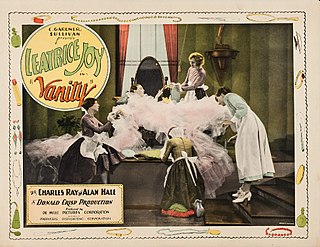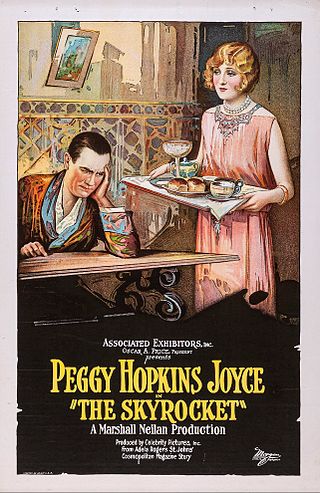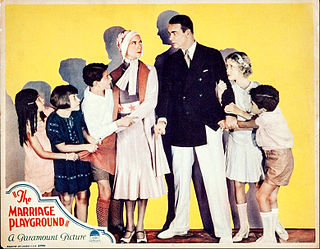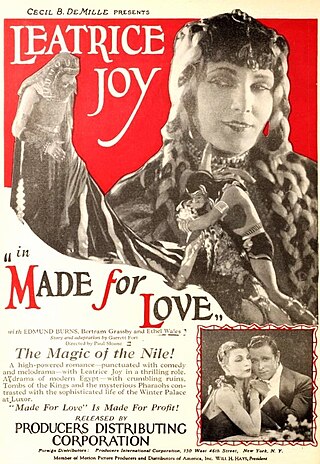
Lilyan Tashman was an American stage, silent film, and sound film actress.
The House That Shadows Built (1931) is a feature compilation film from Paramount Pictures, made to celebrate the 20th anniversary of the studio's founding in 1912. The film was a promotional film for exhibitors and never had a regular theatrical release.

Clifford Hardman "Clive" Brook was an English film actor.

Leatrice Joy was an American actress most prolific during the silent film era.

Saturday Night is a 1922 American silent romantic comedy film directed by Cecil B. DeMille and starring Leatrice Joy, Conrad Nagel, and Edith Roberts. It was Leatrice Joy's first film with DeMille.

Manslaughter is a 1922 American silent drama film directed by Cecil B. DeMille and starring Thomas Meighan, Leatrice Joy, and Lois Wilson. It was scripted by Jeanie MacPherson adapted from the novel of the same name by Alice Duer Miller. Art direction and costumes for the film were done by Paul Iribe.

Déclassée, listed as Déclassé on some posters, is a 1925 American silent drama film of manners produced and released by First National Pictures in association with Corinne Griffith as executive producer. Griffith also stars in the production which was directed by Robert G. Vignola and based on the 1919 play by Zoë Akins that starred Ethel Barrymore.

The Parasite is a 1925 American silent society drama film produced by B. P. Schulberg, and distributed by Al Lichtman and Preferred Pictures. The film was based on the 1913 novel The Parasite by Helen Reimensnyder Martin. It starred Owen Moore, Madge Bellamy, and Mary Carr.

Vanity is a 1927, American silent drama film directed by Donald Crisp and starring Leatrice Joy. The film was written by Douglas Doty, produced by DeMille Pictures Corporation and distributed by Producers Distributing Corporation.

The Clinging Vine is a 1926 American silent comedy film produced by Cecil B. DeMille and Paul Slone and directed by Sloane. It was distributed by DeMille's Producers Distributing Corporation. The film is based on a 1922 Broadway play of the same name by Zelda Sears. The film was a starring vehicle for Leatrice Joy who left Paramount Pictures along with DeMille when he formed his own distributing company PDC.

Eve's Leaves is a 1926 American silent romantic comedy film starring Leatrice Joy and William Boyd. The film was produced and distributed by Cecil B. DeMille and directed by Paul Sloane It is based upon the 1925 play of the same name by Harry Chapman Ford.

The Skyrocket is a 1926 American silent romantic drama film directed by Marshall Neilan and starring Peggy Hopkins Joyce. The film was based on the 1925 novel of the same name by Adela Rogers St. Johns and scripted by Benjamin Glazer.

French Dressing is a 1927 American silent romantic comedy film directed by Allan Dwan and starring H. B. Warner. It was produced and distributed by First National Pictures.

The Marriage Playground is a 1929 American pre-Code drama film directed by Lothar Mendes, and written by Doris Anderson, J. Walter Ruben, and Edith Wharton. The film stars Mary Brian, Fredric March, Lilyan Tashman, Huntley Gordon, Kay Francis, William Austin, Seena Owen and Gene Raymond. The film was released on December 21, 1929, by Paramount Pictures. It's the first film debuted by Gene Raymond.

Made for Love is a 1926 American silent drama film directed by Paul Sloane, produced by Cecil B. DeMille, and starring Leatrice Joy.

Happiness Ahead is a lost 1928 silent film drama directed by William A. Seiter and starring Colleen Moore and then husband and wife Edmund Lowe and Lilyan Tashman. It was produced by First National before it acquired by Warner Brothers. Moore was married to the producer John McCormick who frequently produced her films and they held rights to their films. Moore donated copies of her films to the Museum of Modern Art (MOMA) and over the years the archive allowed the films to decay including Happiness Ahead.

Craig's Wife is a 1928 American silent drama film directed by William C. deMille and starring Irene Rich, Warner Baxter and Virginia Bradford. It was based on the 1925 play Craig's Wife by George Kelly. Subsequent film adaptations followed in 1936 as Craig's Wife and 1950 as Harriet Craig.

The Dark Swan is a 1924 American drama film directed by Millard Webb and written by Frederick J. Jackson. It is based on the 1924 novel The Dark Swan by Ernest Pascal. The film stars Marie Prevost, Monte Blue, Helene Chadwick, John Patrick, Lilyan Tashman, and Vera Lewis. The film was released by Warner Bros. on November 26, 1924.

Rocking Moon is a 1926 American silent drama film directed by George Melford and starring Lilyan Tashman and John Bowers. It was released by Producers Distributing Corporation.

Seven Days is a 1925 American silent comedy film directed by Scott Sidney and starring Lillian Rich, Creighton Hale, and Lilyan Tashman. It is an adaptation of the 1909 play Seven Days, which was based upon a story by Mary Roberts Rinehart.



















